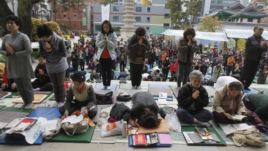當(dāng)前位置: Language Tips> VOA聽力> Special Speed News VOA慢速
分享到
This is the VOA Special English Education Report.
South Korea's education system is highly respected. But there are concerns that academic dishonesty could harm its image in the world. That dishonesty includes cases of falsified research. And in recent months, two South Korean lawmakers have faced accusations that they copied work for their doctoral dissertations.
Of course, problems like these are not limited to South Korea. In April, Hungary's President Pal Schmitt resigned after a Hungarian university withdrew his doctoral title. A committee found that most of the pages of his dissertation on the modern Olympics "were either direct translations or showed partial similarity to other works."
Mr. Kim is a graduate student at Korea University who asked to be identified only by his family name. He says Koreans may not have a well-established understanding of plagiarism. He attended schools in the United States and says Americans seemed to understand that claiming other people's work as their own is wrong.

MR. KIM: "In Korea, that history may not be as long. So there still isn't a huge consensus, in general, amongst all Koreans as to what plagiarism actually means. What is the extent of plagiarism and whether plagiarism itself is acceptable or not."
A VOA reporter asked South Korea's education minister, Lee Ju-ho, how seriously he takes the problem of plagiarism. Mr. Lee said the problem is not as bad as it used to be. He says these incidents gained a lot of attention seven or eight years ago. But he says the problem has mainly disappeared since then because of increased awareness and training. Still, the education minister says he wants to put more effort into eliminating plagiarism.
Mr. Kim, the graduate student, says current efforts to educate college students about plagiarism are not very effective.
MR. KIM: "Korean universities usually have at least one class or some kind of seminar in the beginning of the semester to talk about plagiarism. But as far as I know it is also quite optional. So there are a lot of people who just do not go to the seminar."
He say British and American professors who teach at South Korean colleges are helping to fight plagiarism.
MR. KIM: "One professor in my grad school found a student plagiarizing and automatically gave that student a zero. And I am hearing more of those [incidents] these days."
Lee In-jae is a professor of ethics education at Seoul National University of Education. He says the training should start in elementary school. He says children should learn that copying their classmates' homework or not identifying their sources of information is wrong. If they understand that, he says, then they will be able to write honest papers later in life.
Michael Neil Shapiro, a Canadian, taught at seven different South Korean universities. "In Korea," he says, "there are both ancient and modern reasons for thinking that it's OK to use other people's ideas without giving specific credit." But, East or West, he says, one reason for plagiarism is the same: "intellectual laziness" and the hope not to be discovered.
And that's the VOA Special English Education Report. I'm Mario Ritter.
'Ghost' and 'guest' authors still a concern for medical journals
(來(lái)源:VOA 編輯:旭燕)
分享到
關(guān)注和訂閱


口語(yǔ)
關(guān)于我們 | 聯(lián)系方式 | 招聘信息
電話:8610-84883645
傳真:8610-84883500
Email: languagetips@chinadaily.com.cn